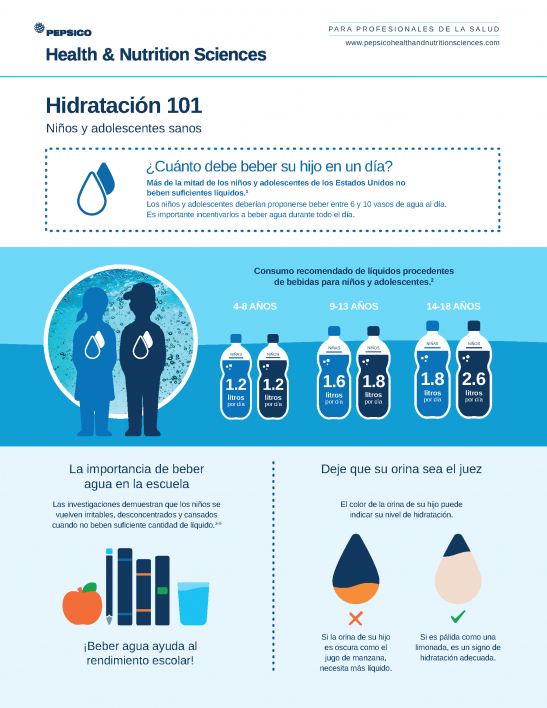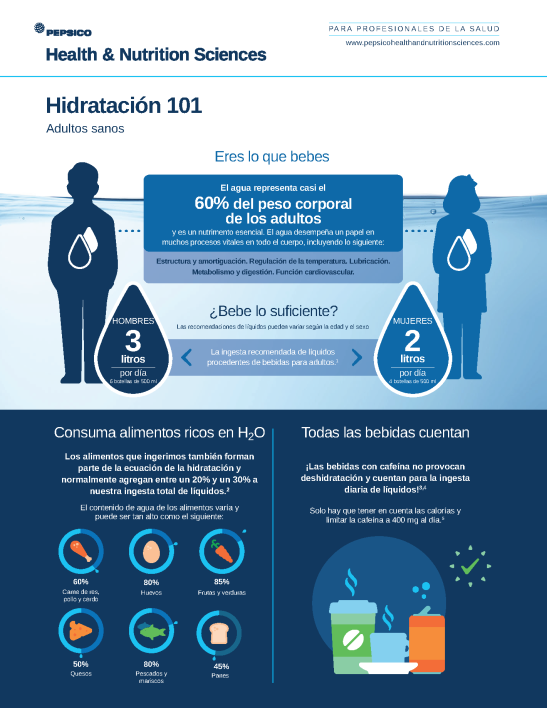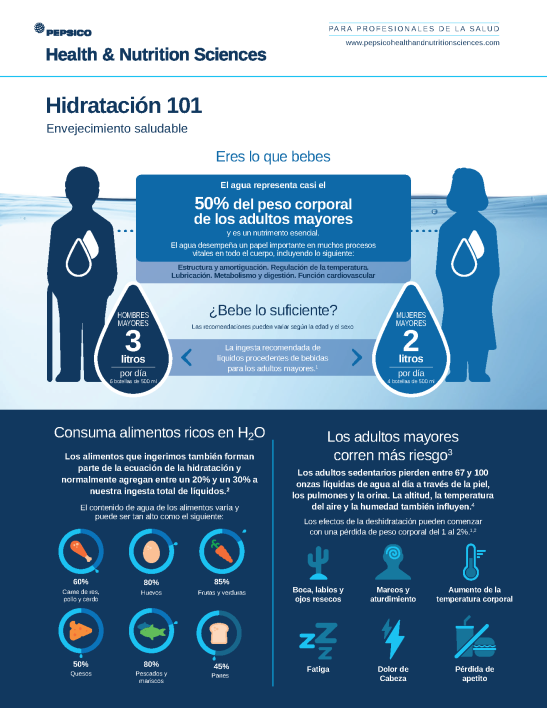Encuentre más materiales sobre el tema en nuestro contenido en inglés.
Navegue esta sección para encontrar publicaciones adicionales de nuestro sitio global.
Vieux, F., Maillot, M., Rehm, C. D., Barrios, P., & Drewnowski, A. (2020). Opposing consumption trends for sugar-sweetened beverages and plain drinking water: Analyses of NHANES 2011–16 data. Frontiers in Nutrition, 7, 587123. doi:10.3389/fnut.2020.587123
Abstract:
Background: Choosing water in place of sugar-sweetened beverages (SSB) can reduce added sugars while maintaining adequate hydration. The present goal was to examine 2011–16 time trends in SSB vs. water consumption across US population subgroups. Methods: Dietary intake data for 22,716 persons aged >4 years came from two 24-h dietary recalls in successive cycles of the National Health and Examination Survey (NHANES 2011–16). Water intakes (in mL/d) from plain water (tap and bottled) and from beverages (SSB and not-SSB) were the principal outcome variables. Intakes were analyzed by age group, income to poverty ratio (IPR), and race/ethnicity. Time trends by demographics were also examined. Results: SSB and water intakes followed distinct social gradients. Most SSB was consumed by Non-Hispanic Black and lower-income groups. Most tap water was consumed by Non-Hispanic White and higher-income groups. During 2011–16, water from SSB declined from 322 to 262 mL/d (p < 0.005), whereas plain water increased (1,011–1,144 mL/d) (p < 0.05). Groups aged <30 years reduced SSB consumption (p < 0.0001) but it was groups aged >30 years that increased drinking water (p < 0.001). Non-Hispanic White groups reduced SSB and increased tap water consumption. Non-Hispanic Black and lower income groups reduced SSB and increased bottled water, not tap. Conclusion: The opposing time trends in SSB and water consumption were not uniform across age groups or sociodemographic strata. Only the non-Hispanic White population reduced SSB and showed a corresponding increase in tap water. Lower-income and minority groups consumed relatively little plain drinking water from the tap.
Vieux, F., Maillot, M., Rehm, C. D., Barrios, P., & Drewnowski, A. (2020). Trends in tap and bottled water consumption among children and adults in the United States: Analyses of NHANES 2011-16 data. Nutrition Journal, 19, 10. doi:10.1186/s12937-020-0523-6
Abstract:
Background: Dietary Guidelines for Americans 2015–20 recommend choosing water in place of sugar-sweetened beverages (SSB). This study examined water consumption patterns and trends among children and adults in the US. Methods: Dietary intake data for 7453 children (4-18y) and 15,263 adults (>19y) came from two 24 h dietary recalls in three cycles of the National Health and Nutrition Examination Survey (NHANES 2011–2016). Water was categorized as tap or bottled (plain). Other beverages were assigned to 15 categories. Water and other beverage intakes (in mL/d) were analyzed by sociodemographic variables and sourcing location. Consumption time trends from 2011 to 2016 were also examined. Total water intakes from water, other beverages and moisture from foods (mL/d) were compared to Dietary Reference Intakes (DRI) for water. Results: Total dietary water (2718 mL/d) came from water (1066 mL/d), other beverages (1036 mL/d) and from food moisture (618 mL/d). Whereas total water intakes remained stable, a significant decline in SSB from 2011 to 2016 was fully offset by an increase in the consumption of plain water. The main sources of water were tap at home (288 mL/d), tap away from home (301 mL/d), and bottled water from stores (339 mL/d). Water and other beverage consumption patterns varied with age, incomes and race/ethnicity. Higher tap water consumption was associated with higher incomes, but bottled water was not. Non-Hispanic whites consumed most tap water (781 mL/d) whereas Mexican Americans consumed most bottled water (605 mL/d). Only about 40% of the NHANES sample on average followed US recommendations for adequate water intakes. Conclusion: The present results suggest that while total water intakes among children and adults have stayed constant, drinking water, tap and bottled, has been replacing SSB in the US diet.
Young, H. A., Cousins, A., Johnston, S., Fletcher, J. M., & Benton, D. (2019). Autonomic adaptations mediate the effect of hydration on brain functioning and mood: Evidence from two randomized controlled trials. Scientific Reports, 9(1), 16412. doi:10.1038/s41598-019-52775-5
Abstract:
Dehydration (water loss >2.0% of body weight) has significant negative effects on physical and mental performance. In two studies the effects of minor hypo-hydration (water loss <1.0% of body weight) on CNS function, mood and cardiovascular functioning were measured. Study 1: On two mornings twelve male participants were exposed to a temperature of 30 °C for four hours and either did or did not drink two 150 ml glasses of water during that time. Study 2: Fifty-six (25 M) individuals were exposed to the same 30 °C environment and randomly allocated to either drink (2 × 150 ml) or not drink. When not given water 0.59% (Study 1) and 0.55% (Study 2) bodyweight was lost. Participant’s heart rate variability (HRV) was measured, and they rated their thirst and mood. In study 1, participants participated in an fMRI protocol during which they completed a modified version of the Paced Auditory Serial Addition Test (PASAT), at the end of which they rated its difficulty. Decreases in fMRI BOLD activity in the orbito-frontal cortex, ventral cingulate gyrus, dorsal cingulate cortex, hypothalamus, amygdala, right striatum, post-central gyrus and superior parietal cortex were observed when participants were hypo-hydrated. These deactivations were associated with reduced HRV, greater perceived effort, and more anxiety. In study 2 declines in HRV were found to mediate the effect of hypo-hydration on ratings of anxiety. These data are discussed in relation to a model that describes how autonomic regulatory and interoceptive processes may contribute to the affective consequences of minor hypo-hydration.
Liska, D., Mah, E., Brisbois, T., Barrios, P. L., . . . Spriet, L. L. (2019). Narrative review of hydration and selected health outcomes in the general population. Nutrients, 11(1), 70. doi:10.3390/nu11010070
Abstract:
Although adequate hydration is essential for health, little attention has been paid to the effects of hydration among the generally healthy population. This narrative review presents the state of the science on the role of hydration in health in the general population, specifically in skin health, neurological function (i.e., cognition, mood, and headache), gastrointestinal and renal functions, and body weight and composition. There is a growing body of evidence that supports the importance of adequate hydration in maintaining proper health, especially with regard to cognition, kidney stone risk, and weight management. However, the evidence is largely associative and lacks consistency, and the number of randomized trials is limited. Additionally, there are major gaps in knowledge related to health outcomes due to small variations in hydration status, the influence of sex and sex hormones, and age, especially in older adults and children.
Vieux, F., Maillot, M., Rehm, C. D., Barrios, P., & Drewnowski, A. (2019). The timing of water and beverage consumption during the day among children and adults in the United States: Analyses of NHANES 2011–2016 data. Nutrients, 11(11), 2707. doi:10.3390/nu11112707
Abstract:
Dietary Guidelines for Americans 2015–20 recommend replacing sugar sweetened beverages (SSBs) with plain water in order to promote adequate hydration while reducing added sugar intake. This study explored how water intakes from water, beverages, and foods are distributed across the day. The dietary intake data for 7453 children (4–18 y) and 15,263 adults (>19 y) came from the National Health and Nutrition Examination Survey (NHANES 2011–2016). Water was categorized as tap or bottled. Beverages were assigned to 15 categories. Water intakes (in mL/d) from water, beverages, and food moisture showed significant differences by age group, meal occasion, and time of day. Plain water was consumed in the morning, mostly in the course of a morning snack and between 06:00 and 12:00. Milk and juices were consumed at breakfast whereas SSBs were mostly consumed at lunch, dinner, and in the afternoon. Children consumed milk and juices, mostly in the morning. Adults consumed coffee and tea in the morning, SSBs in the afternoon, and alcohol in the evening. Relatively little drinking water was consumed with lunch or after 21:00. Dietary strategies to replace caloric beverages with plain water need to build on existing drinking habits by age group and meal type.
Stachenfeld, N. S., Leone, C. A., Mitchell, E. S., Freese, E., & Harkness, L. (2018). Water intake reverses dehydration associated impaired executive function in healthy young women. Physiology and Behavior, 185, 103-111. doi:10.1016/j.physbeh.2017.12.028
Abstract:
Introduction: Healthy women do not always consume Recommended Daily Levels of fluid intake ad libitum. We hypothesized that 1) women lose ≥ 1.0% BW during daily activities, 2) that mild body water loss impairs memory and executive function, 3) water intake to recommended daily levels will improve cognitive function. Methods: We tested 12 women (26 ± 5 yr, 22.5 ± 2.6 kg/m2 BMI). Session 1 was a control (CON) session, during which subjects monitored their food and fluid intake (diary) and activity (Fitbit®). The next two sessions were applied in balanced order: dehydration (DEH) session, where subjects minimized drinking, and a euhydration (EUH) session, where subjects drank Recommended Daily Levels of fluid for their age and sex, or 2500 ml/24 h. We compared emotion, sensory perception and cognition with computer based visual analog tests and computer based cognitive tasks (Cogstate) at 5 PM, i.e. baseline (BL) on the evening prior to the session, and at 7 AM, 12 PM, and 5 PM during the session. Results: Urine specific gravity (USG) was similar at BL across conditions (CON 1.013 ± 0.002, DEH 1.015 ± 0.002, EUH 1.014 ± 0.002) and increased with dehydration (CON 1.011 ± 0.003, DEH 1.021 ± 0.002, EUH 1.010 ± 0.002, P < 0.05) by 5 PM of the session. Uncontrolled fluid intake and physical activity were similar across sessions. The water challenges did not impact Detection, Identification, One-Card Learning, but EUH improved visual and working memory (Groton Maze Learning Test) errors: CON 40.1 ± 11.1, DEH 40.5 ± 10.1, EUH 33.9 ± 10.9, P < 0.05. Executive function [Set Shifting (SETS)] also improved under EUH, errors: BL 22.5 ± 12.7 vs. 5 PM 17.8 ± 6.2, P < 0.05. Conclusions: Mild dehydration caused deficits in visual and working memory and executive function in healthy young women. These deficits were reversed by drinking water to the European Food Safety Authority and Institute of Medicine requirements of 2.5 l/day for adult women.
Turner, J. M., Marsteller, D. A., Luxkaranayagam, A. T., Fletcher, J. M., & Stachenfeld, N. S. (2017). Mild exercise in female subjects impairs complex learning independent of hydration status and emotion. Physiology and Behavior, 180, 113-119. doi:10.1016/j.physbeh.2017.08.013
Abstract:
Introduction Depending on type, intensity and duration, exercise can have both beneficial and detrimental effects on cognitive function. The impact of exercise on learning and memory is also sensitive to hydration status, so we hypothesized that mild hypohydration induced with exercise, will adversely impact executive and complex memory function tasks and that these changes in cognitive function are independent of changes in emotion. Methods Using a cross over design, on separate days 11 women exercised on a recumbent bicycle. On day 1, women exercised to 1.5% hypohydration at 34 °C, and < 10% rh, on day 2, water loss from sweating was replaced by drinking water (euhydration). Pre- and post-euhydration and hypohydration, subjects underwent computer based cognitive tasks (simple, learning, memory, executive function) and visual analog testing to determine emotion. Results Exercise increased Groton Maze Learning Test errors within both conditions: [Pre: 41.5 ± 11.8, Post: 46.8 ± 12.4, and Pre: 41.9 ± 9.2, Post: 46.5 ± 12.9, hypohydrated and euhydrated, respectively, Pre vs Post, ANOVA, time effect, P = 0.007], a test of acquisition, storage, and use of new knowledge. None of the measures of emotion were affected by exercise under either hydration condition.
Conclusions A bout of mild aerobic exercise compromised performance on a complex learning and memory task, but this change was unaffected by hydration status or emotion.



